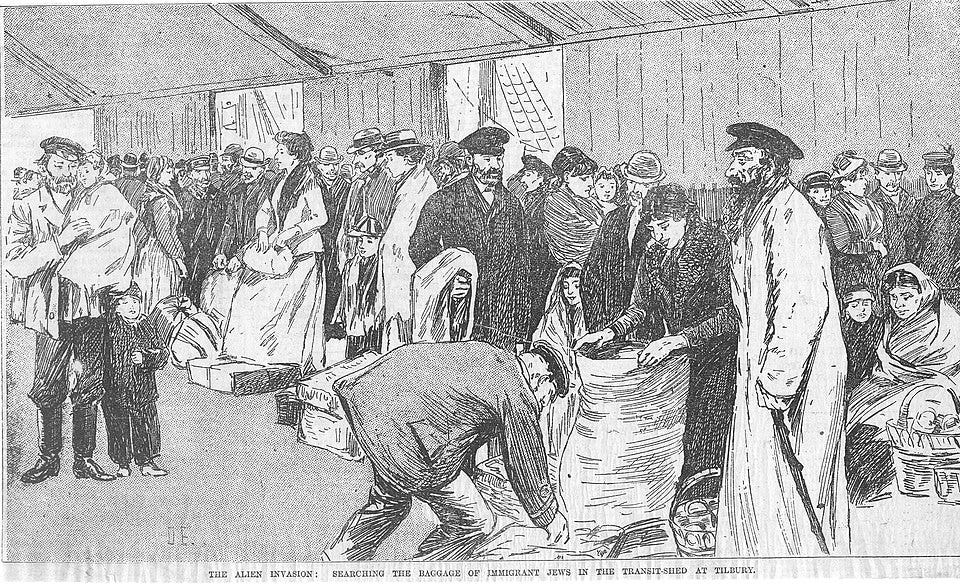It’s a truth, universally unacknowledged, that whenever a British government finds itself in difficulties, and needs a distraction or a scapegoat, or just some immediate political advantage, it will seek headlines on immigration.
These efforts tend to recycle the same wearyingly familiar themes. Governments will blame their predecessors for letting too many people in or losing control of ‘our borders.’ They will announce new and harsher measures for keeping them out. They will say that Britain is generous but too many immigrants are taking advantage of our generosity. That Britain is a welcoming country but too many immigrants are refusing to integrate, learn English and adapt to our values. They will refer darkly to ‘social cohesion’ and ‘public concerns’.
Some politicians will go further, and warn that the country is being flooded by people of an alien culture or citizens of nowhere. In a country whose leaders are always more comfortable punching down than punching up, immigrants and immigration are soft targets - convenient explanations for every social and economic problem.
Why are your wages not going up? Because immigrants are undercutting you. Why can’t you find a job? Because immigrants are taking them. Why can’t you see a doctor or buy a house? Because immigrants have used up the housing stock and monopolised your GP surgery. Why are public services crumbling? You know the answer.
And now Keir Starmer has lent his voice to that grubby tradition. In a 2020 Labour leadership hustings, Starmer once declared:
Conservatives have created this hostile environment…we should welcome people wherever they come from…The whole UK is better because of immigration. If I’m honest, the Labour Party has been a bit scared of making the positive case for immigration for quite a number of years and I think we need to turn that round and broaden it out and make sure that people feel absolutely welcome here. Of course, back in 2020, Sir Keir
I do think, when we get into power, and we will get into power, that will require some changes at the Home Office to change that culture.
Noble, courageous words - or so they seemed - spoken at a time when Starmer was still trying to get the left to vote for him. But now he is in power, and as he never ceases to remind us, the world has changed. Earlier this year, the Home Office announced that refugees and asylum seekers who come to the UK via irregular routes will not normally be granted citizenship, because people who come by boat fail to meet the citizenship requirement of ‘good character.’
So much for changing the culture.
And last week, Starmer delivered one of the most contemptible speeches that any Labour politician has ever given, when he announced the government’s White Paper on immigration. Borrowing from the stalest of all Brexit clichés, the man who once called for a second referendum promised to ‘finally take back control of our borders and close the book on a squalid chapter for our politics, our economy, and our country.
This ‘squalid chapter’ consisted of the ‘chaos’ unleashed by Labour’s Conservative predecessors, who had promised to get immigration down, only for net migration to quadruple. And this outcome was not due to Tory incompetence, over-promising or necessity, or the arrival of refugees from Ukraine and Hong Kong, but the result of
A one-nation experiment in open borders conducted on a country that voted for control. Well, no more. Today, this Government is shutting down the lab. The experiment is over. We will deliver what you have asked for – time and again – and we will take back control of our borders.
It’s impossible to overstate how cynical, dishonest, and downright nonsensical these observations are. Some readers may remember when Tory politicians and the rightwing press once accused the Blair and Brown governments of deliberately flooding the country with Eastern European immigrants in order to ‘rub the right’s nose in diversity.’
Yet here was the man who once opposed Brexit, using the slogans of Brexit to accuse his predecessors of deliberately sneaking immigrants into the country for the last fifteen years. And what to make of this:
Nations depend on rules – fair rules. Sometimes they’re written down, often they’re not, but either way, they give shape to our values. They guide us towards our rights, of course, but also our responsibilities, the obligations we owe to one another. Now, in a diverse nation like ours, and I celebrate that, these rules become even more important. Without them, we risk becoming an island of strangers, not a nation that walks forward together.
Some critics have pointed out the similarity between this framing and Enoch Powell’s ‘Rivers of Blood’ speech. It may indeed be that Starmer’s speechwriters made this reference intentionally, but it’s equally likely that it was the unconscious product of the shallow opportunism and political obtuseness of Starmer’s team - coupled with a resolute refusal to challenge the shopworn nostrums of the great British immigration debate.
Certainly, few people will be unfamiliar with the picture of the generic immigrant that Starmer presented to his listeners - the privileged foreigner without responsibilities or obligations who sneaks through our porous borders and refuses to take part in the life of the nation.
As Starmer put it: ‘when people come to our country, they should also commit to integration, to learning our language, and our system should actively distinguish between those that do and those that don’t’ so that ‘settlement becomes a privilege that is earned, not a right…if you make a contribution, if you work, pay in, and help rebuild our country.’
Though Starmer paid grudging lip service to the immigrants who had contributed to the country after World War II, his speech was not intended to celebrate immigrants, but to condemn the ‘incalculable’ damage inflicted on British society by Britain’s ‘addiction’ to immigration. As he put it:
when you have an immigration system that seems almost designed to permit abuse, that encourages some businesses to bring in lower-paid workers rather than invest in our young people, or simply one that is sold by politicians to the British people on an entirely false premise, then you’re not championing growth, you’re not championing justice, or however else people defend the status quo. You’re actually contributing to the forces that are slowly pulling our country apart.
This simplistic either/or formulation completely ignores the fact that much of the ‘unskilled’ immigrant labour in the UK is a response to labour shortages in social care, construction, the NHS, agriculture and other sectors. But why bother with such details, when you can make comparisons like this?
Sectors like engineering, where visas have rocketed while apprenticeships have plummeted. Is that fair to Britain? Is it fair to young people weighing up their future to miss out on those apprenticeships, to see colleges in their community almost entirely dedicated to one-year courses for overseas students?
Are engineering apprenticeships plummeting? Apprenticeships in general certainly have, but there is no clear causal connection between this outcome and the fact that visas have ‘rocketed’. Nor is it easy to find communities where young people are missing out on apprenticeships because overseas students have taken over their local community college.
I haven’t found any evidence for this, but as Trump, Farage and so many others have shown again and again, something doesn’t have to be true to be politically useful. This seems to be the route that Starmer and his advisors - whoever they are - have decided to go down - the better to promote messages like this:
And this…
It’s not for nothing that Nigel Farage and Robert Jenrick have congratulated the government, and that George Osborne has pointed out that Labour’s immigration policy was ‘very consistent’ with Conservative policy in the past. Abroad, Starmer’s speech earned plaudits from Viktor Orban and the AfD.
These are not compliments that a Labour government should normally welcome, and some Labour supporters have criticised Starmer for encouraging them. Some Starmer loyalists have tried to defend the indefensible. Pat McFadden described criticisms of his speech as ‘overblown.’ Justice Secretary Shabana Mahmood claimed that the speech represented the ‘values of the Labour Party’ and the Prime Minister’s desire to ‘see this country as a nation of neighbours’.
Such claims are not worthy of serious consideration.
It is difficult to avoid the conclusion that Starmer’s speech - along with the White Paper and the visit to Albania with GB News in tow to look into ‘ return hubs’ for failed asylum seekers - is part of a political package intended to advance the interests of the Labour government and no one else’s. Unnerved by its shallow majority and by the electoral rise of Reform, Starmer is making the same mistake that Cameron once made, and inventing policy in an attempt to co-opt Farage’s politics and slogans.
It didn’t work then, and it won’t work now. Because the evidence of the last fifteen years is that the more politicians concede to Farageism, the more they reinforce Farage’s image as the authentic truth-teller, and the more they are likely to take decisions contrary to the national interest and even their own.
Starmer’s nativist turn belongs to the same dismal trajectory. Incredibly, the White Paper is planning to impose a ‘levy’ on British universities that recruit international students, in order to ensure that the ‘benefits’ these students bring to universities are ‘shared.’ In his determination to please Reform voters, Starmer seems to have forgotten that these benefits are already shared, not only in the essential financial contributions that international students make to their universities, but the cities where they live.
Such are the crass and self-defeating policies that governments will adopt in an attempt to cater to the most reactionary, insular and downright xenophobic sectors of the population. And these sectors will never be pleased or satisfied, because they are the product of a deeper political and social malaise that goes beyond this timid, unimaginative and clueless government.
Like its predecessors, Labour is unable or unwilling to challenge ‘the vampiric nature of extreme wealth, which is completely incompatible with the health and wellbeing of the nation,’ as Priya Sahni-Nicholas, co-executive director of the Equality Trust described Britain’s grotesque levels of inequality.
Instead it prefers to present immigrants and immigration as the ur-problem that explains all the others, and pander to a ‘small island’ mentality in which immigration is viewed through a prism of perpetual grievance and perpetual victimhood, reinforced by politicians who benefit from performative demonstrations of toughness.
Who will look after an ageing population if care workers cannot be recruited from abroad? How will the 225,000 shortage of construction workers be filled? How will the NHS remain viable? Who will pick fruit and work in food production? How will British universities finance themselves without the contributions of international students?
Where are the politicians who will explain the trade offs and the advantages of immigration, instead of repeating the same stale tropes that have done so much harm?
They certainly aren’t present in this (Blue) Labour government, and if they are, they don’t dare speak up. Starmer and his supporters may think he is being politically astute, but Labour is not likely to benefit from any of this.
Rightwing voters will always go for what they see as the real thing, while the left will turn away in disgust from a party that increasingly does not represent even the most basic social democratic principles of internationalism and solidarity. And meanwhile Britain will remain what it has been for some time - a spoilt, resentful , xenophobic country increasingly unable to live with immigration and unable to live without it.





This government disgusts me. I'm so angry with them.
Gutter politics indeed. Starmer's credibility as a serious progressive is totally shot.